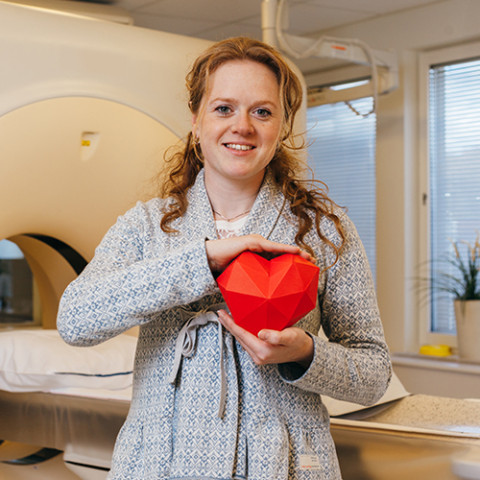Blog
14 May 2024
The power of nursing: An interview with Senuviel Cárdenas Muñoz
Nurses have a profound impact on healthcare worldwide. Beyond their technical skills and medical expertise, they embody compassion, resilience, and dedication. Last Sunday, to celebrate International Nurses Day, we spoke with Unilabs Spain Senuviel Cárdenas Muñoz, a nurse with over 30 years of experience, who shared with us valuable insights on the power of nursing.
What inspired you to become a nurse, and how has your journey shaped your perspective on healthcare?
I was raised in a large family, and my father was a police officer. I was instilled with values from a young age. My mother always cooked extra food in case someone visited. I grew up in a small neighbourhood where people helped each other out. All the generosity and kindness I experienced in my family, school, and community led me to enter healthcare at an early age, starting with a first aid course at school. At sixteen, I began working in a dental medical centre, where I trained as a nursing and dental assistant. After finishing high school, I studied nursing and, once I started working, I saved money to pay for my university nursing degree.
I firmly believe that kindness begets kindness, tenderness begets tenderness, and a profession that allows us to live a life based on these values is nursing. Through nursing, I've learned that those who shout the loudest are often those who need more love, understanding, and compassion.
Another aspect I love about nursing is the teamwork, which allows us to identify and prevent health problems, aid in patient recovery, and promote healthy lifestyles. Nursing enables us to provide specialised care for various conditions and offers the opportunity to specialise in different fields. It is an excellent career for altruistic, generous, and resilient individuals.
Can you share a memorable experience or patient interaction that reaffirmed your passion for nursing?
When I was 24, I had the opportunity to work in intensive care for the first time. I was fascinated by all the technology, and it was incredible to see how someone could undergo open-heart surgery and place their life in the hands of science. It was amazing to see how the medical team and the nursing team would meet every morning to review each patient’s progress and plan the protocol for their recovery. Each member of the intensive care team knew what to do to save the patient's life, and it was there that I understood the value of teamwork for the greater good.
I remember a patient who had been in the ICU for a month. I always encouraged him by telling him his family and his future grandchild were waiting for him. I took a month off for vacation, and when I returned, the patient’s bed was empty, which frightened me. I asked about him and was told he had miraculously improved and had moved to another floor. The doctors laughed and told me that the first thing he did upon waking was to ask about me, the nurse who tenderly encouraged him every day to live. Since then, everyone was cautious about what they said near patients who seemed very unconscious or sedated.
When the patient found out I had returned from vacation, he asked his daughters to take him to see me. When he saw me, with tears in his eyes, he thanked me for giving him a reason to believe in human kindness, compassion, and tenderness and wished me blessings. We embraced, and it was one of the most magical moments of my career. That’s why I know the most beautiful thing you can give others is the joy of serving from the heart, without expecting anything in return, enjoying the pleasure of making a difference in the world.
Apart from your role as a nurse, we know that you are also a writer. Your latest book, written during the pandemic, discusses the power of nursing. Can you tell us a little bit about it?
Behind every illness, there are hidden emotions. Some studies suggest that around 50% of illnesses have an emotional origin. Other research states this figure could be over 80%, as stress, considered the plague of the modern world, is responsible for about fifty pathologies.
Therefore, the main goal of my book 'A Dose of Life for the World: The Power of Nursing' is to promote health through personal empowerment and the art of positive thinking and feeling.
Today, science teaches us about the coherence between the mind and the heart. The heart contains sensory neurons that communicate with the brain, producing an electrochemical stimulus in response to any situation of stress, pain, sadness, or fear. This significant scientific discovery has highlighted the importance of our emotions and the need to learn to be agile, skilled, and resilient in managing our emotions wisely, aiming for an optimal state of health and wellness.
What message would you like to convey to your colleagues and fellow nurses about the significance of your role in healthcare?
Nursing plays a vital role in healthcare, with each specialty being strategic in promoting health and preventing illness through the design and implementation of nursing programmes and practices.
Nursing and compassionate care are two great allies. Some experiences confirm how nursing interventions promote health in patients with certain chronic conditions, both individual and collective, such as hypertension, diabetes, and obesity. Nursing staff are close to the patients, helping, listening, educating, and guiding them as best they can in their healing process.
Nursing professionals are also a pillar of support and education for caregivers and the patient's family members, guiding and training them to care for the patient while also taking care of themselves.
I want to sincerely commend my colleagues for their outstanding humanitarian, supportive, and altruistic work, and encourage them to continue being examples of kindness, responsibility, friendliness, and dedication for the greater personal, social, world, and universal good.

